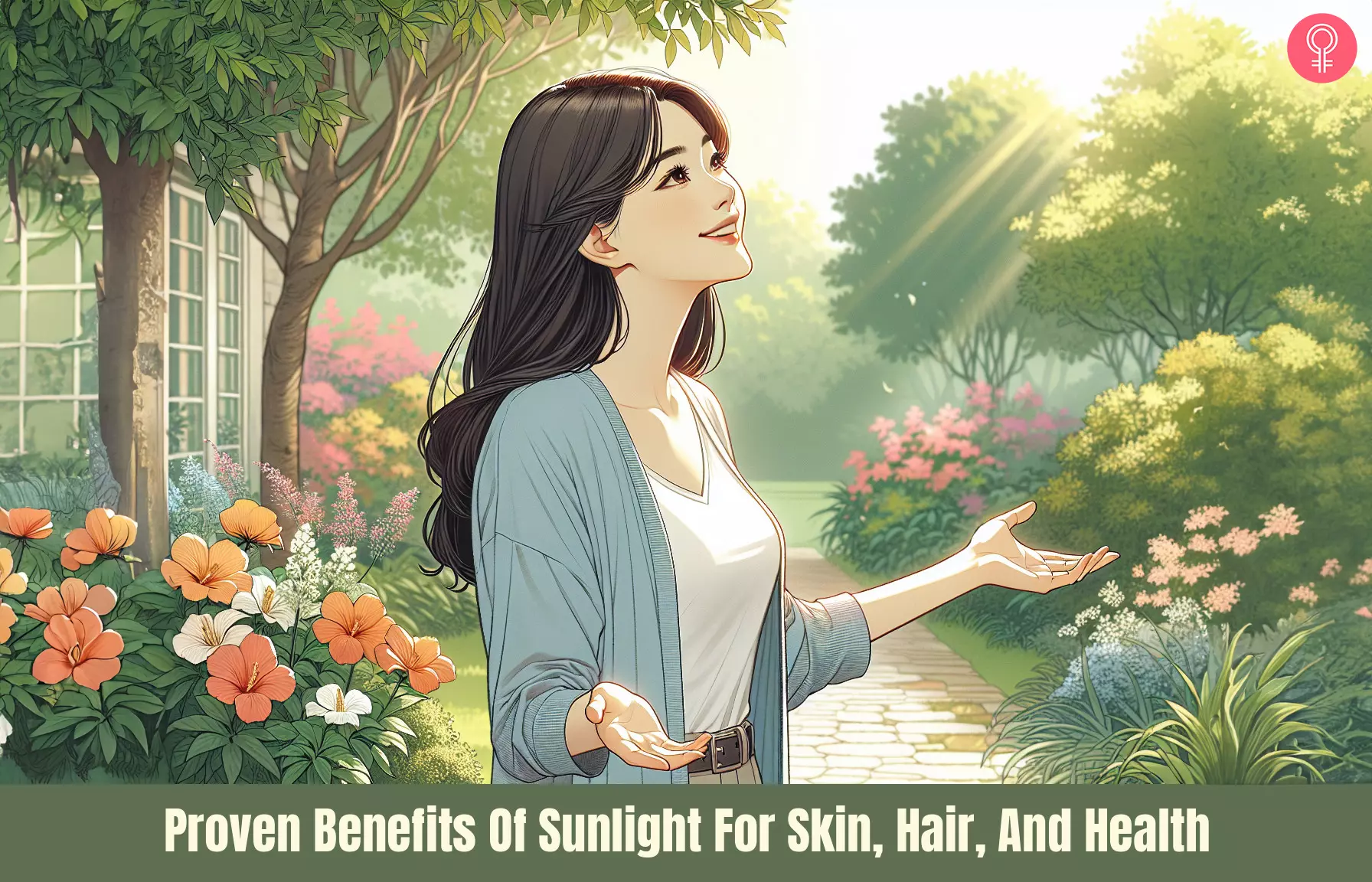While excessive exposure to sunshine is undoubtedly harmful, it is important to remember that the sun is essential for our growth and functioning. Sunbathing was once considered an element of yoga. It was thought to have a variety of healing effects. Many cultures, including the Greeks, prefer sunbathing to treat various ailments. Scientists have now indicated that exposure to the ultraviolet (UV) radiation found in sun rays has positive and negative impacts on humans. Some diseases can be cured by the same UV light that causes skin problems (1)! Sunlight not only aids our body in responding to traumatic situations, but it also has a variety of additional functions, including blood pressure regulation, insulin release management, and the conversion of fat and carbs into energy. Let’s take a look at the benefits of sunlight for your skin, hair, and overall wellness. Keep scrolling.
Benefits Of Sunlight For Health
1. Boosts Supply Of Vitamin D
It’s no secret that the sun is one of the richest sources of vitamin D that is essential for good health. By constantly applying sun block creams and lotions on your skin every time you step out of your home, you are depriving yourself of this precious vitamin. Vitamin D is vital to support your immune system and for protection against dementia, aging of the brain, minimizing asthmatic symptoms as well as improvement in the health of your teeth and bone density. You may be surprised to know that it also protects your body against cancer. But, do you need direct sunlight for vitamin D? A study on 1658 participants found that individuals with serum vitamin D levels below 25 nmol/L had a 125% higher risk for all-cause dementia and a 122% higher risk for Alzheimer’s disease as compared to people with 50 nmol/L. This suggests there might be a link between low vitamin D levels and an increased risk of dementia. The supply of Vitamin D increases due to sunlight, which is why it is also known as the sunlight vitamin. Mostly, every tissue in our body is regulated by the active form of Vitamin D – 1,25-Dihdroxyvitamin D3(1,25[OH]2D3), some of it being involved in the metabolism of calcium, the immune system, and neuromuscular functions. Vitamin D deficiency occurs due to a lack of outdoor sun exposure (2).
2. Sunlight May Protect You From Prostate Cancer
The lesser sunlight you get, the higher your chances of being diagnosed with prostate cancer. Yes! You read it right. It is a well-known fact among scientists. According to preliminary studies, lack of sunlight may increase the risk of prostate cancer (3), (4).
3. Sunlight Lowers Cortisol Levels
The stress hormone is known as cortisol. It may increase your appetite and experts suggest that high cortisol levels lead to weight gain. In a study conducted by the Center for Neuroscience, University of Colorado, it was found that through exposure to bright light, cortisol levels can be decreased (5).
4. Sunlight For Depression
Morning sunlight benefits people suffering from depression and improve their mood and mental health. Due to less sun exposure, a particular form of depression called seasonal affective disorder (SAD) can occur. It mainly happens in winters or during fall. In 2001, a study conducted by the University of Milan, Italy shows that early morning sunlight can reduce the longevity of hospitalization in patients with bipolar depression. In the case of hospital rooms where no sunlight enters, the patients’ length of hospitalization is increased as compared to the rooms where sunlight enters ( 6).
5. Lack Of Sunlight Increases Your Risk Of High Blood Pressure
When exposed to sunlight, the body’s stores of nitrogen oxides are released into the bloodstream, which decreases blood pressure due to the expansion of blood vessels. In addition, sunlight can directly affect heart health and the risk of cardiovascular disease according to the same report. It seems that Vitamin D is one of the most powerful hormones for regulating blood pressure (1), (7).
6. Sunlight Lowers The Risk Of Multiple Sclerosis
According to several studies less direct sunlight received by the people living at higher latitudes leads to a higher incidence and prevalence of multiple sclerosis. Higher latitudes include North America, Europe, and, of course, places like Iceland (8), (9), (10).
7. Sunlight Lowers Your Risk Of Diabetes
According to experts, Vitamin D has a preventative effect on diabetes. A study in the year 2006, led by the University of Lund and Malmö University Hospital, Sweden found that the consumption of Vitamin D in early life was strongly associated with a lower risk of type 1 diabetes (11).
8. Helps Treat Psoriasis
Psoriasis is a skin disease in which red, dry plaques are produced which thicken the skin. It is said that it is a non-curable disease. Light therapy is used for the treatment of psoriasis and is known as phototherapy. The sun is the source of light and therefore, sunlight can help you reduce psoriasis (12), (13).
9. Sunlight Treats Vitiligo
Vitiligo may be caused by an auto-immune process and it is treated with ultraviolet light (UVA) exposure in combination with a drug or a natural remedy. It is a skin disease in which white patches occur on the skin. Some areas of the pigment-making cells are destroyed in this disease (14), (15).
10. Sunlight Protects Against Asthma
Adults and children with uncontrolled asthma have significantly lower levels of Vitamin D in their blood than those found in healthy people. This was claimed by a study in 2013, which was conducted by Dr. Stephanie Korn in Germany. Those who use corticosteroidsi Anti-inflammatory medication that reduces immune system activity and helps with hormonal imbalances. or sputum eosinophilia have a higher risk of acquiring Vitamin D deficiency (16).
11. Helps You Lose Weight
Another amazing benefit of sunlight is that it helps in weight management. Sunbathing is actually great if you want to lose weight. Mice fed a high-fat diet showed reduced weight when exposed to low doses of UV radiation (17). However, more information is warranted in humans.
12. Sunlight May Help Manage Jaundice
Exposing newborns with jaundice to sunlight or phototherapy is a common practice and is a wonderful natural remedy. The sunlight helps in the breakdown of bilirubin (yellow-orange pigment that gives yellow color to the skin, eyes, and urine) in the skin, which is then excreted from the body (18). Anecdotal evidence suggests that exposure to one hour of sunlight equals six hours under the special bilirubin lights. This process is often used to treat mild jaundice cases in neonates. However, make sure to do this only during the early morning or late afternoon, and always protect sensitive areas of the skin from direct sunlight. Marina Shynkarenka, a YouTuber, talks about her experience of getting morning sunlight for 50 days, which helped her develop a healthy sleep-wake cycle. She also noticed increased energy, stating, “I noticed that I started going to bed early and waking up early and feeling good as my sleep improved (i).”
Benefits Of Sunlight For Skin
Apart from providing a great tan, sunlight has some amazing skin benefits.
12. Treats Acne And Other Skin Disorders
Skin disorders, such as acne, psoriasisi A chronic autoimmune condition that causes the skin to develop dry, flaky, and itchy patches due to rapid cell growth. , eczema, etc. can be healed with the power of sunlight. A study indicated that heliotherapyi The use of sunlight to treat diseases, improve bone quality, and increase vitamin D levels, thus enhancing the quality of life. did wonders in relieving the symptoms of psoriasis. Fungal infections can also be healed with sunlight (19).
13. Sunlight Therapy
Sunlight therapy works marvelously well. The trick to making sure that your skin benefits instead of getting damaged is to gradually expose your skin to the sun instead of complete exposure from the very first day. This is especially important if you are sensitive to the sun and your skin is not used to the exposure (20).
Benefits Of Sunlight For Hair
Is sunlight good for hair? It’s not just your skin that needs the sun for health. Your hair may benefit from the sun as well. Vitamin D seems to have a positive effect on the hair follicles – though more research is warranted in this regard (21).
14. Remedy For Hair Loss
While this is great news for those who are dealing with hair fall, it is important to also remember that overexposure to sunlight can do more damage than good. So, go easy on giving your hair a dose of the sun’s rays. The epithelial cells that help your hair grow are known to be highly sensitive to UV light, and too much exposure can deplete the levels of vitamin E and C that are essential for hair growth.
15. Helps Hair Growth
Sunlight allows your body to produce Vitamin D and this, in turn, stimulates the growth of your hair and prevents hair loss. The several benefits of sunlight for the skin include supplying vitamin D, protecting from prostate cancer, lowering cortisol levels, and helping people who suffer from depression. It also helps regulate blood pressure, lower the risk of multiple sclerosisi An autoimmune condition that attacks the central nervous system and inhibits the brain’s ability to send signals to the rest of the body. and diabetes, prevents psoriasis, improves sleep quality, circadian rhythm sleep–wake disorders and melatonin production, treats vitiligo, acne, and helps hair growth (22). Though sunlight has many advantages for your skin, too much exposure can cause harmful effects. Here we come to the question: why is sunscreen important? It helps to shield your skin from damaging UV rays. So, always wear sunscreen while going out in the sun. How much sunlight per day do you need? You should ideally get 10 to 30 minutes of sunlight every day. Is sunlight good for eye health? No, directly staring at the sunlight is not good for eye health and may cause damage to the eyes. Does sunlight affect your mood? Yes, sunlight affects your mood by increasing the release of serotonin, which is associated with boosting mood. The mood-boosting effects of ultraviolet light were also observed in several human and animal studies (23). However, more relevant research is needed to support these claims. Can sunlight help with sleep? Yes, sunlight can help with sleep as sunlight exposure in the morning can reset your body’s inner sleep clock. In a study on elders staying in a nursing home, it was observed that exposure to direct sunlight between 8 AM and 10 AM for 5 days helped improve sleep quality (24).
Illustration: Proven Benefits Of Sunlight For Skin Hair And Health
Unlock the incredible benefits of sunlight in this enlightening video. Learn how sunlight positively impacts mood, boosts vitamin D levels crucial for bone health, and enhances sleep quality. Check out this video now!










![]()

